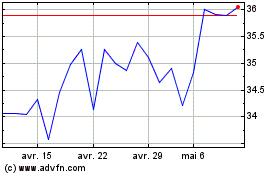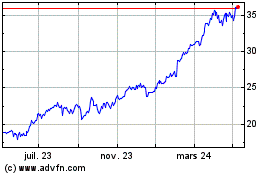Italy's UniCredit To Cut 8,000 Jobs, Launch Buybacks -- WSJ
04 Décembre 2019 - 9:02AM
Dow Jones News
By Giovanni Legorano and Pietro Lombardi
This article is being republished as part of our daily
reproduction of WSJ.com articles that also appeared in the U.S.
print edition of The Wall Street Journal (December 4, 2019).
LONDON -- Italy's largest bank, UniCredit SpA, ruled out
targeting big acquisitions as it pledged share buybacks and
dividend increases, part of a four-year plan that also includes
cuts in jobs and costs.
The bank said it would focus on growing organically amid a
challenging economic environment, after struggling to increase its
share price in comparison to peers in recent years, despite
progress under Chief Executive Jean Pierre Mustier.
UniCredit intends to cut roughly 8,000 jobs, or around 9% of the
total workforce, and close about 500 branches through 2023 as it
targets gross savings of EUR1 billion ($1.1 billion) in Western
Europe.
The plan offers an insight into the headwinds faced not just by
UniCredit but by fellow banks. Profits at Europe's largest lenders
have been dented by low rates, stringent regulation and greater
competition from U.S. rivals. Most of the region's banks are
downsizing, cutting costs or realigning their businesses as a
result.
UniCredit said it would return EUR8 billion to shareholders
through 2023, including a share buyback of EUR2 billion. This
corresponds to an increase of profit distribution to shareholders
of 40% in the next three years, rising to 50% in 2023.
Mr. Mustier said the bank prefers to use capital in this way
instead of buying other European banks. Speculation has mounted in
recent months that UniCredit was eyeing a tie-up with troubled
German lender Commerzbank AG or France's Société Générale SA
UniCredit has never commented on specific potential mergers, but
Mr. Mustier has often cast doubt on the viability of European
cross-border banking tie-ups, citing regulatory hurdles and likely
additional capital needs.
Instead, the bank prefers to buy back some of its shares, he
said Tuesday.
"In short, no M&A and that's it," he told reporters, saying
the bank would consider only "small bolt-on acquisitions" mainly in
central and Eastern Europe.
While Italian lenders have made considerable progress in
digesting the pile of bad loans accumulated during the financial
crisis, they are struggling to modernize their operations and make
their businesses leaner.
At the end of June, Italian banks owned EUR177 billion of bad
loans, or 8% of their total loans, compared with EUR350 billion, or
17% of total loans, at the end of 2016.
Their revenue is under pressure from negative rates. The
pressure to deploy liquidity induced by negative rates has
increased competition among banks to lend money. This in turn has
pushed down interest rates applied on new mortgages and company
loans.
Average interest rates charged on residential mortgages dropped
to 1.69% in August, from 2% on existing loans up to December last
year, according to estimates from consulting firm Oliver Wyman.
Interest rates on company loans dropped by 80 basis points to 1.26%
over the same period.
Lower rates on government bonds are also putting additional
pressure on banks' revenue.
Italian banks have tried in recent years to make more money
through fees and commissions on wealth and asset management, with
patchy results.
One of the few levers remaining is to cut costs. However,
Italian banks need to make large investments to improve the
digitization of their businesses and train their personnel. Oliver
Wyman estimates that almost half of Italian bank employees need to
be trained in new skills, as their business models change and the
use of new technology spreads.
UniCredit aims to increase its net profit to EUR5 billion for
2023, slightly higher than the EUR4.7 billion planned for this
year.
Earnings per share are projected to grow 12% a year, while
UniCredit aims for revenue to rise roughly 0.8% a year to EUR19.3
billion in 2023. Costs are expected to decline 0.2% a year and
reach EUR10.2 billion when the plan ends.
The bank said it doesn't plan any more large asset sales after
it agreed over the weekend to cut its stake in Turkish bank Yapi ve
Kredi Bankasi AS to below 32% from roughly 41%, aiming to simplify
its shareholding structure and boost its capital.
Over the past three years, UniCredit has sold several other
assets, including Polish lender Bank Pekao SA and asset management
firm Pioneer Investments. More recently, it sold its stakes in
online lender FinecoBank SpA and in Mediobanca SpA.
Write to Giovanni Legorano at giovanni.legorano@wsj.com and
Pietro Lombardi at Pietro.Lombardi@dowjones.com
(END) Dow Jones Newswires
December 04, 2019 02:47 ET (07:47 GMT)
Copyright (c) 2019 Dow Jones & Company, Inc.
Unicredit (BIT:UCG)
Graphique Historique de l'Action
De Mar 2024 à Avr 2024

Unicredit (BIT:UCG)
Graphique Historique de l'Action
De Avr 2023 à Avr 2024
